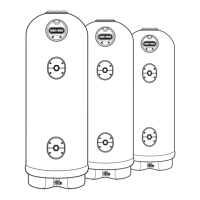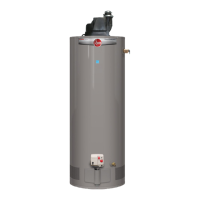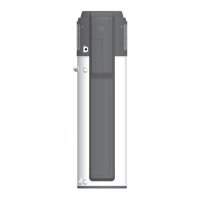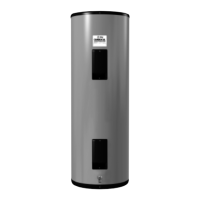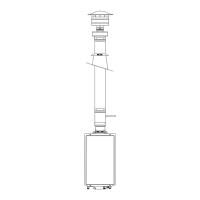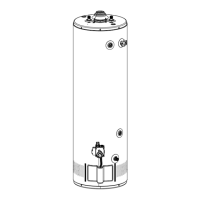Leak Testing
The water heater and its gas connections
must be leak tested at normal operating
pressures before it is placed in operation.
Turn on the manual gas shut-off
valve near the water heater.
Use a soapy water solution to test for
leaks at all connections and fittings.
Bubbles indicate a gas leak that must
be corrected.
The factory connections to the gas control
(thermostat) should also be leak tested
after the water heater is placed in
operation.
High Altitude
Ratings of gas appliances are based
on sea level operation and need not be
changed for installations at elevations up
to 5,999 feet (1828.5 m).
Pressure Testing the Gas Supply System
The water heater and its manual gas shut-
off valve must be disconnected from the
gas supply piping system during any
pressure testing of that system at
pressures in excess of 3/8” psi (10.5”
w.c.) (2.6 kPa) for natural gas, or 1/2 psi
(14” w.c.) (3.5 kPa) for LP gas.
The water heater must be isolated
from
the gas piping system by closing the
manual gas shut-off valve during any
pressure testing of the gas supply piping
at pressures equal to or less than
3/8” psi (10.5” w.c.)(2.6 kPa) for natural
gas, or 1/2 psi (14” w.c.) (3.5 kPa) for LP
gas.
Gas Supply
The branch gas supply line to the water
heater should be clean 1/2” black steel
pipe or other approved gas piping
material.
A ground joint union or ANSI design
certified semi-rigid or flexible gas
appliance connector should be installed in
the gas line close to the water heater. The
Canadian Standards Association mandates
a manual gas shut off valve: See CSA
B149- Installation Code for complete
instructions.
Compound used on the threaded joints of
the gas piping must be of the type
resistant to the action of LP gas. Use
compound sparingly on male threads only.
A sediment trap should be installed at the
bottom of the gas line.
Do not use excessive force (over 31.5 ft
lbs.)(42.7 Nm) in tightening the pipe joint
at the gas control (thermostat) inlet,
particularly if teflon pipe compound is
used, as the valve body may be damaged.
The inlet gas pressure to the water heater
must not exceed 10.5” w.c. (2.65 kPa) for
natural gas, or 14” w.c. (3.5 kPa) for LP
gas. For purposes of input adjustment, the
minimum inlet gas pressure (with main
burner on) is shown on the water heater
rating plate. If high or low gas pressures
are present, contact your gas supplier for
correction.
WARNING: Never use
an open flame to test for
gas leaks, as property
damage, personal injury, or
death could result.

